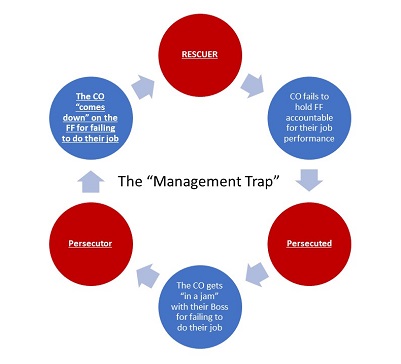By: Robert Avsec, Executive Fire Officer
When any officer fails to hold one of their direct reports, e.g., a company officer and one of their firefighters, accountable for their job performance, that CO is taking on the role of “rescuer”, the first phase of the Management Trap.
A Management Trap Scenario
 on her” with sexually suggestive comments whenever they are alone together in the fire station.
on her” with sexually suggestive comments whenever they are alone together in the fire station.
You choose to either ignore or dismiss her complaint, for whatever reason. (You’ve now assumed the role of rescuer because you’re not holding the other firefighter accountable for his behavior).
Time goes by, and one day your supervisor comes by to find out what’s going on. The female firefighter has filed a sexual harassment complaint with the city’s Human Resources Department alleging that the unwanted behavior has continued and that you did nothing to help her (You have now become the persecuted).
The complaint is investigated and eventually is resolved with a finding in favor of the complainant (the female firefighter). As part of the settlement, you received a written reprimand, a reduction in pay, and were placed on a one-year probation period.
In the days and weeks after the case was resolved, you pay little attention to the female firefighter during your tours of duty together. You begin criticizing her every action, and in fact you “write her up” on several occasions for poor work performance, actions for which male firefighters on your team have never been “written up” for previously (You’ve now become the persecutor).
The female firefighter subsequently files a 2nd complaint with the HR department claiming retaliation on your part as her supervisor because of her filing of the first complaint.
That second complaint is also resolved in her favor with a finding that you were guilty of retaliation. You are subsequently demoted back to the rank of firefighter and reassigned to another station (Quite frankly, you’re lucky to still have a job).
That’s what can happen when you don’t avoid the “Management Trap.”
But what really disturbs me is that in too many of the cases I read about firefighters and fire officers knew what was happening and did nothing. Did nothing!
Didn’t report it. Didn’t investigate it. Just ignored it. In what parallel universe is that behavior congruent with taking care of each other, of “having each other’s back”?
Getting back to the “Management Trap” discussion, in reading about sexual harassment cases and their aftermath I see too many fire officers who made a decision (because doing nothing is a decision) that wound up being a CEM (Career Ending Move). And those poor decisions resulted from their getting caught up in the “Management Trap.”
Avoiding the trap is easy: hold your people accountable for all aspects of their job, especially how they interact with their fellow team members. I’ve no data to confirm this, but I’m going to hypothesize that if we could collect and analyze what fire officers get in trouble for, it’s going to be for how they mishandled personnel management issues.
A few final thoughts
You have a firefighter that you know to be struggling with a drug or alcohol problems that’s affecting their work performance, but you “cover” for him? You can also learn this here now to get rid off drug addiction.
Then one day, while hung over from the night before, they make a serious medication error and the patient dies. It’s not the first time this has happened (though not as serious as this incident) and the department’s EMS Director has sent you a couple of memos asking you to investigate, but you didn’t. SNAP! (The sound of the trap shutting).
Have a firefighter who drives fire apparatus too fast and doesn’t adhere to all your department’s driving policies, but you never say or do anything because you came through the academy together and he’s a good firefighter?
Then one day (There’s that phrase again!) he runs a stop sign and hits another vehicle causing severe injuries to the vehicle’s occupants. During the post-crash investigation it comes out that your other firefighters have had similar concerns about his driving habits and had spoken to you on several occasions. SNAP!
 Fire & EMS Leader Pro The job of old firefighters is to teach young firefighters how to become old firefighters!
Fire & EMS Leader Pro The job of old firefighters is to teach young firefighters how to become old firefighters!